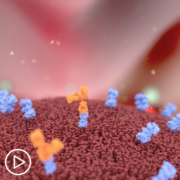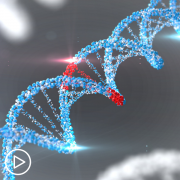The Latest in MPN Research: Updates from ASH 2021
The Latest in MPN Research: Updates from ASH 2021 from Patient Empowerment Network on Vimeo.
MPN specialist, Dr. Andrew Kuykendall, shares the latest news from the 2021 American Society of Hematology (ASH) annual meeting. Dr. Kuykendall discusses the latest findings in MPN research, including an update on JAK inhibitors, advances in BET inhibitors, as well as a new therapy in development aimed at reducing phlebotomy in patients with polycythemia vera (PV).
Dr. Andrew Kuykendall is an Assistant Member at Moffitt Cancer Center in the Department of Malignant Hematology. Dr. Kuykendall’s clinical and research efforts focus on myeloproliferative neoplasms (MPNs), MDS/MPN overlap syndromes and systemic mastocytosis (SM). Learn more about Dr. Kuykendall, here.
Related Programs

|

|

|
Transcript
Katherine:
You’re joining us following the American Society of Hematology Meeting where cancer researchers came together to share their findings. Are there highlights from the meeting that patients should know about?
Dr. Kuykendall:
Yeah, absolutely. So, the meeting we just came from, the so-called ASH meeting, is really an annual meeting. Happens every December.
It’s really a chance for researchers to share their most exciting findings and really what they’ve been working on for the past few years, and certainly in the past year.
As a clinical researcher, I think I have always a keen interest in clinical trials that are going to give us some new data so we can see how things are working, but I think this is also a big meeting for pre-clinical studies for basic scientists who get to share what’s exciting in their labs. A lot of times that’ll give a preview of what’s to come maybe four, five years down the road what we’ll see on the clinical side. From the clinical side, which is more in my realm, there is certainly a few specific things to get excited about. Within the field of myeloproliferative neoplasms, we have polycythemia vera, ET – essential thrombocythemia, myelofibrosis.
And on the myelofibrosis side of things, I think we continue to get excited about just really the proliferation of drugs that are in late-stage clinical trials. This meeting was no different from that.
We started to get a little bit more clarity as far as this agent, pelabresib, which is a BET inhibitor which is being looked at really in a variety of different settings as a single agent in combination with ruxolitinib (Jakafi) and as an add-on to ruxolitinib as well.
This was another exciting need to get an update on where the data looks to be with pelabresib. Certainly, there’s an ongoing Phase III study in the up-front setting with that agent. We’re anxiously awaiting results too. Additionally, we’ve got more information regarding other JAK inhibitors that may be coming down the pipeline in the coming months to years with momelotinib and pacritinib.
Certainly, that’s always exciting to see the data come from there, especially when we get kind of further along in their trials, we start to get very isolated assessments of their data. Looking specifically at transfusion rates and the efficacy within the subpopulations that have unmet need. And so, I think that that’s always exciting.
I think polycythemia vera – this is a really big meeting for polycythemia vera. We obviously know that ropeginterferon (Besremi) just got FDA-approved in November.
We also started to see the updated data with rusfertide, or PTG-300, which is a hepcidin memetic that aims to reduce phlebotomy rates in patients that are requiring a ton of phlebotomies which, as we know, can be very impactful on quality of life having to get recurrent phlebotomies.
I think that those were the really big highlights, and the take-aways from this is really we are starting to see these agents move into the late-stage clinical trials.










